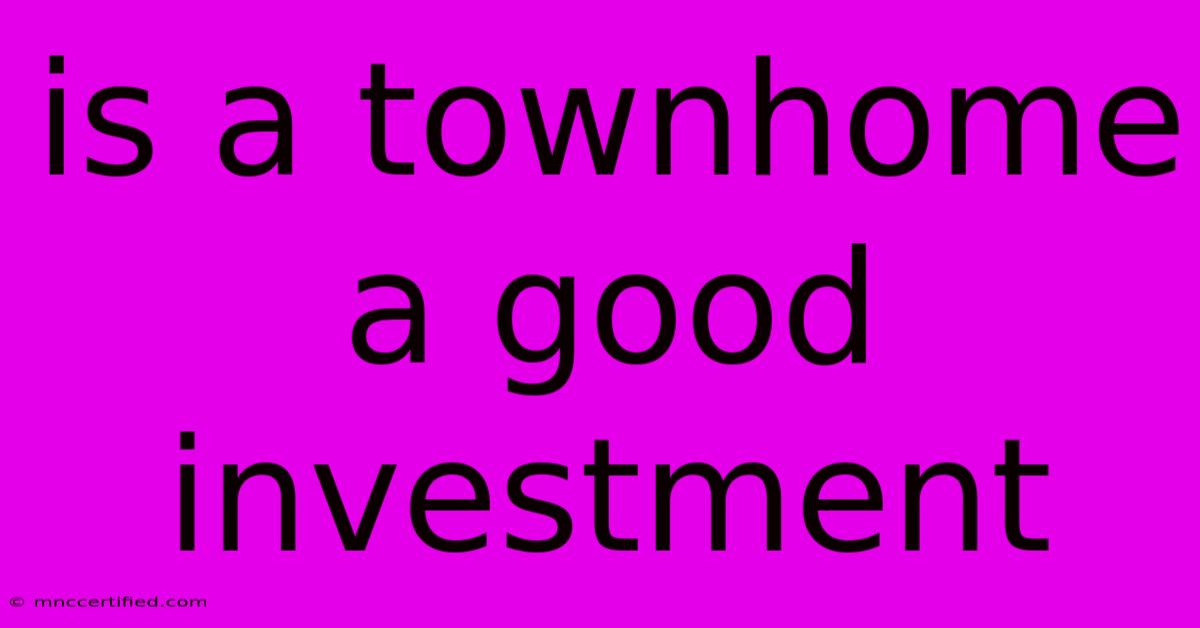Is A Townhome A Good Investment

Table of Contents
Is a Townhome a Good Investment? A Comprehensive Guide
Buying a home is a significant financial decision, and choosing between a single-family home, a condo, or a townhome adds another layer of complexity. This article delves into the question: Is a townhome a good investment? We'll explore the pros and cons, helping you determine if this property type aligns with your financial goals and lifestyle.
The Allure of Townhome Living: Weighing the Pros
Townhomes offer a unique blend of benefits that appeal to a wide range of buyers. Let's explore the advantages that make them an attractive investment option:
1. Affordability and Lower Maintenance: A Winning Combination
One of the most compelling reasons to consider a townhome is its affordability. Compared to detached single-family homes, townhomes often come with a lower purchase price, making homeownership accessible to a broader range of buyers. Furthermore, the reduced maintenance is a significant plus. Exterior upkeep, including landscaping, roof repairs, and siding maintenance, is typically handled by a homeowner's association (HOA), freeing up your time and reducing your out-of-pocket expenses.
2. Amenities and Community Living: Enhanced Lifestyle
Many townhome communities offer desirable amenities such as swimming pools, fitness centers, playgrounds, and walking trails. This fosters a sense of community and provides added value to your investment. This amenity-rich lifestyle can be a major selling point, increasing property values and attracting potential buyers in the future.
3. Location, Location, Location: Access to Desirable Areas
Townhomes are often situated in prime locations, offering easy access to urban conveniences, excellent schools, and vibrant social scenes. This strategic positioning can significantly impact your investment's long-term appreciation potential. The desirable location contributes to higher rental yields if you choose to rent your townhome.
4. Potential for Rental Income: A Passive Income Stream
Townhomes are popular rental properties. Their relatively lower purchase price and manageable maintenance make them an attractive investment for landlords. Generating rental income can offset mortgage payments and provide a steady stream of passive income. This makes them particularly appealing to investors seeking a diversified portfolio.
The Challenges of Townhome Ownership: Understanding the Cons
While townhomes present numerous advantages, it's essential to consider the potential drawbacks before investing:
1. HOA Fees: A Recurring Cost
Homeowner's association (HOA) fees are a non-negotiable aspect of townhome ownership. These fees cover maintenance, landscaping, and amenities. While they offer convenience, they represent a recurring cost that can significantly impact your budget. Thoroughly research HOA fees before purchasing to ensure they align with your financial capabilities.
2. Limited Customization and Privacy: Balancing Community and Individuality
Unlike single-family homes, townhomes offer limited opportunities for customization and exterior modifications. HOA regulations often restrict alterations to the property's exterior. Furthermore, the close proximity of neighbors may mean less privacy compared to a detached home. Consider if this level of community and limited customization suits your lifestyle preferences.
3. Potential for Resale Challenges: Market Dynamics
While townhomes can appreciate in value, their resale market can be influenced by various factors, including the condition of the community, HOA fees, and the overall state of the housing market. Understanding the local real estate market dynamics is crucial before investing in a townhome.
4. Shared Walls: Noise Considerations
Living in close proximity to neighbors means sharing walls, which can lead to noise issues. While well-constructed townhomes minimize noise transfer, it's a factor to consider if you value peace and quiet.
Is a Townhome Right for You? A Final Verdict
The decision of whether a townhome is a good investment depends on your individual circumstances, financial goals, and lifestyle preferences. Carefully weigh the pros and cons outlined above. Research the specific community, examine HOA documents meticulously, and assess the local real estate market. By conducting thorough due diligence, you can make an informed decision that aligns with your long-term financial objectives and contributes to a fulfilling lifestyle. Remember to consult with financial advisors and real estate professionals to guide your investment strategy.

Thank you for visiting our website wich cover about Is A Townhome A Good Investment. We hope the information provided has been useful to you. Feel free to contact us if you have any questions or need further assistance. See you next time and dont miss to bookmark.
Featured Posts
-
National Specialty Insurance Nj
Nov 26, 2024
-
Investment Property Kansas City
Nov 26, 2024
-
How Much Is Xray With Insurance
Nov 26, 2024
-
Maui Invitational U Conns Opening Win
Nov 26, 2024
-
Jason Mcgary Fisher Investments
Nov 26, 2024